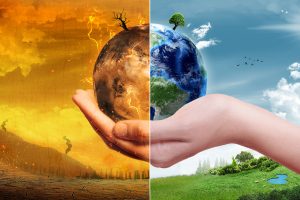Musa Sattar, UK
Each year, World Wetlands Day is celebrated on 2nd February to raise global awareness about the indispensable contributions of wetlands on the ecosystems of our planet.
Wetlands come in all shapes and sizes, from unobtrusive saltmarshes to sparkling lagoons and tumbling freshwater streams. Wetlands unquestionably stand as one of the major repositories of ecological services to our planet. They are a rich source of carbon storage, serve as haven for wildlife, and play a critical role in climate mitigation, adaptation, biodiversity, as well as human health and prosperity.
Wetlands Increasingly Under Threat.
Sadly, due to new developments, and fulfilment of human needs, we have lost about 85% of the world’s wetlands. According to reports by the Intergovernmental Science-Policy Platform on Biodiversity and Ecosystem Services (IPBES), this precious resource is increasingly under threat. With a disappearance rate three times faster than that of forests, hundreds of thousands of animal and plant species are currently endangered. The situation is becoming more alarming each passing day: within the past couple of decades, almost 1 million species have been threatened with extinction. The ramifications of environmental degradation continue to gradually undo the ecological advancements that have been developing naturally for over millions of years.

A Sign of Blessing
We often neglect the Wetlands’ intrinsic value to wildlife and people. Despite research showing the benefits of wetlands, public awareness of such resources and their impact on the planet is limited. Allah the Almighty states in the Holy Qur’an:
وَاِنۡ تَعُدُّوۡا نِعۡمَةَ اللّٰہِ لَا تُحۡصُوۡھَا ؕ اِنَّ اللّٰہَ لَغَفُوۡرٌ رَّحِیۡمٌ
‘And if you try to count the favours of Allah, you will not be able to number them. Surely, Allah is Most Forgiving, Merciful.‘ (16:19)
And also
قُلۡ اَرَءَیۡتُمۡ اِنۡ اَصۡبَحَ مَآؤُکُمۡ غَوۡرًا فَمَنۡ یَّاۡتِیۡکُمۡ بِمَآءٍ مَّعِیۡنٍ
‘Say, “Tell me, if all your water were to disappear in the earth, who then will bring you clear flowing water?”‘ (67:31)
Protecting Wetlands is a Religious and Social Duty
Islamic teachings provide humanity with effective solutions to today’s environmental challenges. Islam has always emphasised on the importance of protecting the environment and conserving natural resources. It reminds us that there is a delicate balance of nature that we have to do justice to all natural habitats. We must preserve them and take care to not disturb them to the point of environmental or ecological damage – or worse, destruction.

خَلَقَ الۡاِنۡسَانَ عَلَّمَہُ الۡبَیَانَ اَلشَّمۡسُ وَالۡقَمَرُ بِحُسۡبَانٍ وَّالنَّجۡمُ وَالشَّجَرُ یَسۡجُدٰنِ وَالسَّمَآءَ رَفَعَھَا وَوَضَعَ الۡمِیۡزَانَ اَلَّا تَطۡغَوۡا فِی الۡمِیۡزَانِ وَاَقِیۡمُوا الۡوَزۡنَ بِالۡقِسۡطِ وَلَا تُخۡسِرُوا الۡمِیۡزَانَ
‘He created man. He taught him plain speech. The sun and the moon run their courses according to a fixed reckoning. And the stemless plants and the trees humbly submit to His will. And the heaven He has raised high and set up the measure, That you may not transgress the measure. So weigh all things with justice and fall not short of the measure.’ (55:4-10)
If we exceed this delicate balance by destroying our environment, we will be going against the commandment of the Holy Quran. Therefore, in Islam, protecting and looking after our environment is considered both a religious duty as well as a social duty. Let’s celebrate the World Wetland Day by increasing awareness about their importance to the planet and its life.
About the Author: Musa Sattar has an MSc in Pharmaceutical Analysis from Kingston University and is also serving as the Assistant Manager of The Review of Religions and the Deputy Editor of the Science & Religion section.



Add Comment